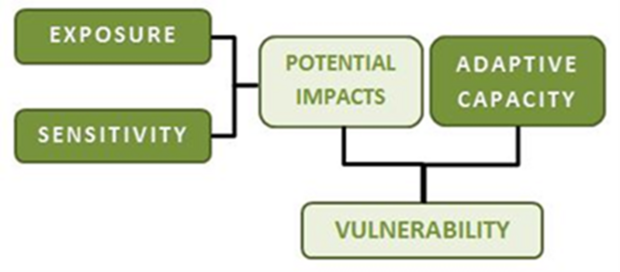How will climate change make things worse?
As warming oceans contribute increasing amounts of energy to weather systems, climate models predict increasing intensity and frequency of tropical storms and major hurricanes (Category 3 and higher). Winter storm intensity and frequency are also likely to continue to increase.
Who is exposed to extreme weather events?
Extreme weather events directly expose people to flood water and storm debris. Disruption of infrastructure (e.g., septic/sewage/wastewater treatment facilities, the electric grid, transportation, and communication systems) may result in exposures to extreme cold or heat, unsafe food and drinking water, mold in homes and buildings, loss of electrical power for medical equipment, and loss of access to medical services. Individuals may be exposed to waterborne pathogens (e.g., bacteria) or toxic chemicals through contaminated food, drinking water, floodwaters, or soil. Carbon monoxide poisoning can result from improper use of power generators or outdoor appliances (e.g., camp stoves), malfunctioning fireplaces, or blockages to heating equipment vents or vehicle tailpipes.
What are the health effects?
Physical injury and premature death are the most serious health impacts during a flood. Longer-term health impacts include increases in food- and water-borne illnesses, worsening of pre-existing medical conditions, and respiratory illnesses due to mold exposure. Flooding and roadblocks can hinder emergency vehicle response. Property damage and displacement of homes and businesses can lead to loss of work and long-term mental stress for those facing relocation. Individuals may also experience post-traumatic stress, anxiety and depression following major flooding events.
Who is vulnerable to extreme weather events?
Identifying populations most vulnerable to the health burdens of climate change is an important step in developing state and local adaptation plans. Publicly available data can be used to assess the health-related vulnerability for extreme weather events. Some examples of vulnerability data for Massachusetts are provided below.
- 14.7% of MA residents are age 65 or older, and 29.2% of older adults live alone1
- 7.9% of MA residents under age 65 are living with a health-related disability1
- 11.7% of MA residents live below the poverty line1
- 18.2% of MA residents identify as “nonwhite”1
How can we assess vulnerability to climate hazards?
Climate vulnerability is a function of:
- Potential impacts from exposure (contact with the climate hazard) and sensitivity (e.g., age, pre-existing health conditions, social disparities) that may increase or decrease health impacts
- Adaptive capacity – factors that influence the ability to respond and recover from climate impacts
This page provides information to assess exposure, sensitivity, and adaptive capacity to reduce climate change impacts. This information should be considered when planning actions to reduce health risks from extreme weather events in Massachusetts communities.
What are the factors that influence vulnerability to extreme weather events?
Assessment of community-specific vulnerabilities will inform adaptation planning efforts. By considering these factors, communities can increase health equity and resilience to climate change impacts. The Massachusetts Environmental Public Health Tracking website provides helpful tools and community-specific vulnerability data.
- Sociodemographic
- People over age 65
- People over age 65 and living alone
- Children under age 5
- People of Color
- People who are living below the poverty line
- People experiencing homelessness
- People with limited knowledge of English
- Environmental
- Degraded water quality
- Coastal and stream bank erosion
- Ecosystem damage
- Damage aquatic and agricultural resources
- Damage to parks and recreational land
- Pre-Existing Health Conditions
- Adults with respiratory disease (e.g., asthma, COPD) and/or cardiovascular disease
- Children with respiratory disease (e.g., asthma)
- People using medical equipment that requires electrical power or medications that require refrigeration
- People with physical disabilities or special needs
- People with mental health challenges
- Infrastructure
- Interruption of utilities (e.g., electric, phone, internet)
- Failure of wastewater treatment systems
- Loss of safe drinking water
- Disruption of transportation and communication systems
- Loss of access to medical services
- Food and supply shortages
- Property damage and displacement of homes and businesses
Intervention Strategies for Reducing the Health Impacts of Extreme Weather Events
- Identify vulnerable populations and health issues in your community using the DPH Community Profiles, and other tools available on the EPHT website
- Identify critical facilities and infrastructure at risk from flooding, such as drinking water and sewer facilities, and implement modifications that decrease potential flood damage, and/or relocate critical infrastructure from vulnerable areas
- Identify and map vulnerable locations and populations using DPH’s Climate Change Vulnerability Mapping Tool
- Assess capability to deploy power generators and water pumps to healthcare facilities
- Encourage preparedness in the home, in schools, in the workplace, and at healthcare facilities
- Develop communication and outreach plans to raise awareness of evacuation routes, flood zones, and response plans
- Support implementation of DPH’s Mass in Motion and other Wellness programs to increase community resilience
- Implement actions to prepare for storms from DPH’s Division of Environmental Health Regulations and Standards (EHRS)
- Implement actions to prepare for extreme weather from DPH’s Office of Preparedness and Emergency Management’s (OPEM) website
- Promote actions to address and prevent water damage and address mold growth following a storm
- Incorporate extreme weather information and storm probabilities into planning, transportation, and public works projects
- Develop campaigns to educate the public on proper generator use and the hazards from combustion appliances
- View the 2023 ResilientMass Plan for information on adaptation strategies
- View the Massachusetts Climate Change Adaptation Report, Chapter 6: “Human Health and Welfare” for health adaptation strategies
References
- 5-Year US Census American Cities Survey, 2018. For data, visit MassMapper.
Who can I contact to learn more?
Specialists at the Massachusetts Department of Public Health, Bureau of Climate and Environmental Health, are available to answer your questions. Contact us at 617-624-5757 (TTY: 617-624-5286).
Additional Resources
-
Open PDF file, 314.6 KB, Climate Hazard Assessment Profile: Extreme Weather Events (English, PDF 314.6 KB)
-
Open DOCX file, 780.31 KB, Climate Hazard Assessment Profile: Extreme Weather Events (English, DOCX 780.31 KB)
